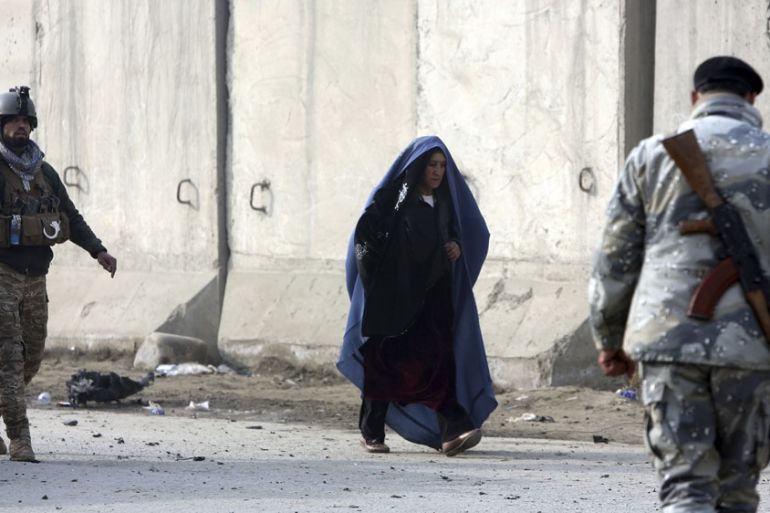US-Taliban talks stir hope for peace, fears for women’s rights
While Afghans are encouraged by talk of the war ending, they fear any deal with the Taliban could limit women’s rights.

As Taliban members and US officials met in Doha, Qatar earlier in January for talks aimed at finding a solution to end the 17-year war in Afghanistan, Khalid Bashari revisited his father’s poems expressing love for his country.
He was 19 when his father was shot dead by unknown people in 2016 in their hometown of Khogyani district in the south of Nangarhar, a province bordering Pakistan.
In one Pashto poem, his father had written:
“Every person here has a story to tell, I swear the Americans are here!
“No one can sleep in peace these days, when the caravan of Americans is here!
“We saw a lot of prisoners, by God, when the caravan of the evil Americans got here!”
Now burdened with domestic responsibilities, Bashari sells wood to feed his family of five, and is concerned about his sisters’ education, security and a stable income.
Meanwhile, in hotels and conference rooms, peace talks are under way and focused on the withdrawal of US troops from Afghanistan.
Like many Afghans, Bashari is tired of hearing talk and wants to see action.
“What we have seen both from Taliban and American troops is horrible,” he told Al Jazeera. “I don’t want to feel the same fear any more, I am scared for my siblings and their future.
“I want people to continue going to school, especially girls. I want my sisters to be educated so that they raise their children well.”
The six-day talks in the Qatari capital ended on Saturday and raised hope among Afghans that the war could finally end, with both US and Taliban officials hailing progress.
However, there are two sticking points for both parties: a ceasefire and the withdrawal of foreign forces.
So far, the Taliban have refused to hold talks with Afghan officials and have stressed on speaking only with the United States. But US officials are attempting to push the Talibanto speak to Afghan officials.
Bashari said he wants peace, whether US troops stay or leave.
“We have been living in a war-zone for too long with constant firing, shelling, raids and air strikes becoming so normal to us. I have seen all of this growing up, how would it be to have peace around us?”
Women Al Jazeera interviewed were concerned particularly for their rights if any power is shared with the Taliban.
Midwife Sharifa Sofi said life was challenging for female nurses and doctors during the Taliban’s leadership, from 1996 until 2001, when a US-led invasion toppled the group.
“We want peace but we don’t want the Taliban regime back, it was the worst time for us women as they did not allow women to work,” she said. “Female doctors and nurses were allowed, but they had to be accompanied by their [male legal guardian].”
This peace deal will decide the future of Afghan women
Some women also expressed concern over representation in the diplomatic process; there are no women involved in the talks.
Pashtana Durrani, 20, is an activist who runs LearnAfg, an NGO dedicated to innovation in education with a focus on women’s rights.
She said when the Taliban were removed from power, steps were taken to ensure women’s rights.
“Girls could go to schools, women could go to doctors and most importantly have a voice and vote,” she said.
“This peace deal will decide the future of Afghan women and their position in leadership in politics, in schools, and everywhere … it’s half of the population.
“A peace deal is supposed to be inclusive and open to women rights, meaning they are non-negotiable. Women of Afghanistan can decide for themselves and some men on a table, an exclusive group, cannot decide a half the population’s fate.”
Durrani said if US troops leave, “we might repeat history where women will be beaten, shot in the heads, and their noses cut. Where women will be treated as second class citizens, just because they are women.”
Taliban promises moderate stance
A senior Taliban member, speaking to Al Jazeera anonymously, said the group would strike a moderate tone on women’s education and their right to work.
“It won’t be the same for women like it used to be during our regime in Afghanistan. They will have access to education and will have their rights,” he said.
On Wednesday, Suhail Shaheen, spokesman for the Taliban’s political office in Doha, said in a statement to the Associated Press that they are looking for ways to “coexist with Afghan institutions”.
Shaheen said the Taliban want to live with other Afghans, “tolerate one another and start life like brothers”.
“We believe in an inclusive Afghan world, where all Afghans can see themselves in it,” the statement said.
With both hope and a sense of dread among Afghans, US and Taliban officials have promised to resume talks again in the near future.
But for 45-year-old Kabul resident Schoeib Sabri, the US has failed to bring peace in Afghanistan and is time for the foreign forces to leave.
“The Afghan people have suffered for 17 years facing cruel and horrific events of this war,” he said. “If the US could not bring peace all these years, it is time for them to leave this country.”
Mohsin Khan Momand reported from Kabul for this article.